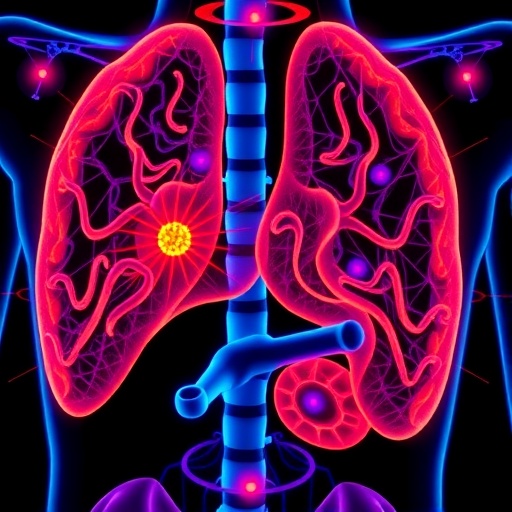In the realm of oncology, the quest for precision medicine has led to intriguing advancements that hold promise for cancer patients worldwide. A recent study delves into a pivotal area of hepatocellular carcinoma (HCC) treatment, leveraging cutting-edge technology to predict the response to the targeted therapy drug, lenvatinib. This innovative approach utilizes MRI-based radiomics signatures, shedding light on how imaging data can enhance treatment outcomes and personalize patient care.
Hepatocellular carcinoma, a prevalent form of liver cancer, poses significant treatment challenges. Traditional prognostic models often fall short due to their reliance on clinical parameters that may not sufficiently capture the intricacies of tumor biology. In light of these limitations, researchers are exploring the potential of radiomics—a field that focuses on extracting large amounts of quantitative features from medical images, revealing insights that could lead to improved therapeutic decision-making.
The study conducted by Huang and colleagues embarks on a retrospective cohort investigation, meticulously analyzing MRI data from HCC patients undergoing treatment with lenvatinib. This drug is a multi-targeted tyrosine kinase inhibitor that has transformed the management landscape for advanced HCC. However, the variability in patient responses underscores the necessity for tools that can predict treatment efficacy, thereby facilitating tailored therapeutic strategies.
At the heart of this research lies the concept of radiomics, which involves the extraction of high-dimensional data from radiological images. Applying machine learning techniques to these data sets, researchers can identify patterns and correlations that are not readily apparent. The study employed sophisticated algorithms to dissect various imaging features, aiming to create a radiomics signature that correlates with the patients’ response to lenvatinib.
The findings from the analysis are striking. The identified radiomics signatures demonstrate a significant association with treatment outcomes, including overall survival and progression-free survival. This correlation suggests that such imaging biomarkers could serve as a critical asset for clinicians, equipping them with the ability to stratify patients based on their predicted response to lenvatinib. Such stratification could optimize treatment plans, reduce unnecessary side effects, and ultimately enhance the quality of life for HCC patients.
One of the key takeaways from the study is the ability of MRI-based radiomics to transcend traditional biomarkers. While conventional markers often rely on histopathological evaluations and serum tumor markers, the integration of advanced imaging techniques opens new avenues for real-time assessment of tumor characteristics. This paradigm shift is immensely important, as it allows for dynamic monitoring of tumors and the potential for early intervention if a patient is unlikely to benefit from lenvatinib.
The methodological rigor of the study cannot be overlooked. The research team meticulously adjusted for various confounding factors, ensuring the robustness of their findings. By incorporating a diverse patient population and employing advanced statistical techniques, the study underscores the reliability of MRI-based radiomics as a predictive tool. This not only bolsters the credibility of their results but also highlights the potential of this approach in wider oncological applications.
Moreover, the implications of this research extend beyond individual patient care. By adopting a radiomics-based framework, healthcare providers can advance toward a more personalized approach in oncology, aligning treatment strategies with specific patient profiles. This is particularly crucial in the context of HCC, where the heterogeneity of tumors can dramatically influence treatment efficacy.
As the medical community continues to grapple with the complexities of cancer treatment, the integration of radiomics could signify a major leap forward. The established link between MRI-based signatures and treatment outcomes offers a foundation for further exploration in clinical settings, where such tools can be incorporated into routine practice. Future studies will undoubtedly build upon these promising findings, validating radiomics signatures across diverse populations and treatment modalities.
Ultimately, the success of this research hinges on collaborative efforts between radiologists, oncologists, and data scientists. As interdisciplinary teams work together, the translation of radiomics from bench to bedside is poised to revolutionize oncology practice. This cooperation is essential to refine radiomics methodologies and expand their applicability in various cancer types, potentially paving the way for broad-scale implementation in clinical oncology.
In conclusion, Huang et al.’s groundbreaking study is a testament to the potential of MRI-based radiomics in enhancing the efficacy of targeted therapies for hepatocellular carcinoma. By providing a novel approach to predict treatment response, this research not only enriches our understanding of HCC but also reinforces the importance of personalized medicine in cancer care. As the field continues to evolve, the future of oncology may very well rest on the sophisticated analysis of imaging data, unlocking new horizons in the fight against cancer.
Subject of Research: MRI-based radiomics signatures in hepatocellular carcinoma
Article Title: MRI-based radiomics signatures for predicting the efficacy of targeted therapy with lenvatinib in hepatocellular carcinoma: a retrospective cohort study.
Article References:
Huang, K., Ma, H., Liu, H. et al. MRI-based radiomics signatures for predicting the efficacy of targeted therapy with lenvatinib in hepatocellular carcinoma: a retrospective cohort study.
J Cancer Res Clin Oncol 151, 251 (2025). https://doi.org/10.1007/s00432-025-06306-7
Image Credits: AI Generated
DOI: 10.1007/s00432-025-06306-7
Keywords: radiomics, hepatocellular carcinoma, MRI, lenvatinib, personalized medicine, cancer treatment, predictive modeling, multi-targeted therapy.
Tags: advanced liver cancer managementhepatocellular carcinoma treatmentimaging data in treatment decisionsMRI-based radiomics signaturesmulti-targeted tyrosine kinase inhibitorspersonalized cancer therapyprecision medicine in oncologypredicting lenvatinib responseradiomics in cancer treatmentretrospective cohort study in oncologytherapeutic decision-making in HCCtumor biology and treatment outcomes





